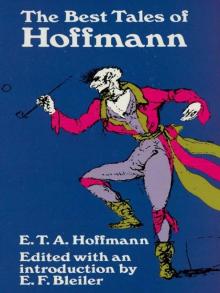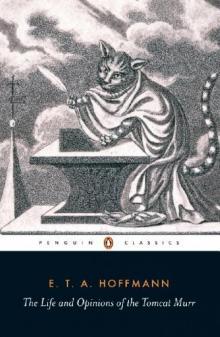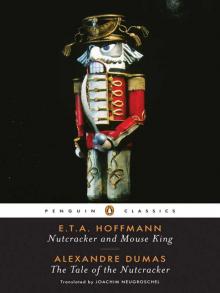- Home
- E. T. A. Hoffmann
The Sandman
The Sandman Read online
E. T. A. Hoffmann
* * *
THE SANDMAN
Translated by
Peter Wortsman
Contents
The Sandman
Follow Penguin
E. T. A. HOFFMANN
Born 1776, Königsberg, Prussia
Died 1822, Berlin, Prussia
‘The Sandman’ was written in 1816 and first published in 1817 in Die Nachtstücke (‘The Night Pieces’).
HOFFMANN IN PENGUIN CLASSICS
Tales of the German Imagination from the Brothers
Grimm to Ingeborg Bachmann
Tales of Hoffmann
The Life and Opinions of the Tomcat Murr
NATHANIEL TO LOTHAR
You must surely all be worried sick not to have had word from me in such a long, long time. Mother is, no doubt, upset with me, and Clara may well believe that I am living the high life here, and have forgotten the face of my beloved angel so deeply and indelibly graven in my heart and mind. But it isn’t so; every day of the week and every hour of the day I think of you all and my lovely little Clärchen’s friendly figure floats past me in my dreams, smiling so sweetly at me with her bright eyes as she is wont to do whenever I walk in. Oh how could I put pen to paper in this wretched state that till now distracted my every thought! Something awful came into my life! Dark premonitions of a terrible impending fate cast their pall over me like the shadows of black storm clouds impermeable to any friendly rays of sunlight. Let me tell you then what happened to me. I have to tell you, that much I know; but just to think about it makes it spill out like a mad burst of laughter. Oh my dearest Lothar! How should I begin to make you fathom that what befell me just a few days ago could have such a devastating effect on my life! If only you were here, you could see for yourself; but by now you must surely take me for a crack-brained spook seer. In short, the terrible thing that happened to me, whose fatal impression I have tried in vain to erase from my consciousness, consists in nothing else than that a few days ago, namely on 30 October, at twelve noon, a barometer salesman stepped into my room and offered me his wares. I bought nothing and threatened to throw him down the stairs, whereupon, however, he promptly left of his own accord.
You suspect, I imagine, that only the most extraordinary life-altering relations could have lent this occurrence such significance, indeed that it was the very person of that miserable pedlar that surely had such a poisonous effect on me. And that is just what happened. I will pull myself together, with all the strength of my will-power, quietly and patiently to recount the circumstances of my early youth as plainly and precisely as possible so that you, with your alert mind, may take everything in and paint as clear as possible a picture of my condition. But even now as I begin, I can hear you laughing and Clara remarking: ‘What childish notions!’ Laugh, if you like, have yourself a right hearty laugh at my expense! Be my guest! But God in heaven, my hair stands on end, and it seems to me as if I were begging you in my mad desperation to make me sound ridiculous, like Franz Moor did Daniel. But it’s time to begin!
Except for at lunchtime, we, my siblings and myself, saw little of my father during the day. He must have been very busy. After supper, which, according to long-standing custom, was served at seven o’clock, all of us, my mother and us, gathered in my father’s study, and each took our place at a round table. Father smoked and drank a tall glass of beer. Often he told us many wondrous tales and would get so involved in the telling that his pipe went out, and it was my duty to fetch a burning wad of paper for him to relight it, a task that gave me the greatest pleasure. But many times he would just give us picture books to look at and sit there in silence propped up in his easy chair, blowing dense clouds of smoke, so that we all hovered as though in a fog. On such evenings mother was very sad and no sooner did the clock strike nine than she would declare: ‘Now children, to bed! To bed with you! The Sandman’s coming, I can sense it!’ And every time she said it I really did hear the sound of slow, heavy steps lumbering up the stairs; it must have been the Sandman.
One time the muffled thump and lumbering step sounded particularly grim to me; so I asked mother as she led us away: ‘Mama, who is that evil Sandman who always chases us away from Papa? What does he look like?’
‘There is no Sandman, my dear child,’ replied mother; ‘when I say the Sandman is coming, all it means is that you children are sleepy and can’t keep your eyes open, as if somebody had scattered sand in them.’
Mother’s answer didn’t satisfy me – indeed the notion took firm hold of my childish imagination that mother only denied the existence of the Sandman so that we wouldn’t be afraid, didn’t I hear him with my own two ears coming up the steps? With a burning desire to know more about this Sandman and his connection to us children, I finally asked the old woman who took care of my youngest sister: ‘What kind of man is that, the Sandman?’
‘Oh, Thanelchen,’ she replied, ‘don’t you know yet? He’s a bad man who comes to visit children when they won’t go to sleep and flings a handful of sand in their eyes, so they scratch themselves bloody, then he flings them in his bag and carries them off to the half-moon to feed his children; they sit up there in their nest and have crooked beaks like owls with which they pick out the eyes of naughty human brats.’
So in my mind I painted a grim picture of that awful Sandman; as soon as I heard that lumbering step on the stairs I trembled with fear and horror. My mother could get nothing out of me but that one word stuttered amidst tears: ‘Sandman! Sandman!’ Then I bounded up to my bedroom and all night long I was tormented by the terrible presence of the Sandman.
By the time I was old enough to know that all that business about the Sandman and his children’s nest on the half-moon the nanny had told me couldn’t possibly be true, the Sandman had become entrenched in my mind as a hair-raising spook, and I was gripped by dread and terror when I heard him not only come clambering up the steps but tearing open the door to my father’s study and barging in. Sometimes he stayed away a long time, but then he came more often, night after night. This went on for years, but I was never able to get used to that ghastly spook, nor did the grisly image of the Sandman ever fade from my mind.
I got ever more worked up about his dealings with my father; while some unbridgeable reserve kept me from asking him about it, the desire grew stronger from year to year to find out the secret for myself – to see the fabled Sandman with my own two eyes. The Sandman lured me down the path of wonder, the craving for adventure, that longing that had already taken seed in my childish mind. I liked nothing better than to hear or read fear-tingling tales of goblins, witches, sprites and suchlike; but the Sandman remained at the head of my list of the grisly figures I scribbled with chalk and charcoal on table tops, cupboards and walls.
When I turned ten, my mother moved me from the nursery into a little room off the corridor not far from my father’s study. We still had to make ourselves scarce at the strike of nine, when that unseen presence was heard in the house. From my little room I distinctly heard him enter my father’s chamber and soon thereafter it seemed to me as if the entire house filled with a strange-smelling vapour. My ever-mounting curiosity stirred my pluck to try and find a way to make the Sandman’s acquaintance. Many times I slipped out into the corridor as soon as mother had passed, but I was too late, since by the time I reached the spot from which I might catch a glimpse of him, the Sandman had invariably already entered. Finally, driven by an overpowering urge, I decided to hide in my father’s room and await the Sandman’s appearance.
One evening, by my father’s silence and my mother’s sadness I surmised that the Sandman was coming; and so, pretending to be very tired, I excused myself before nine o’clock and hid in a nook beside my father’s door. The fro
nt door creaked, the slow, heavy thud of steps advanced through the vestibule towards the stairs. Mother hastened by me with my brothers and sisters. Quietly then I opened my father’s door. He was seated in silence, as usual, with his back to the door; he did not notice me slip in behind the curtain drawn over a closet where he hung his clothes.
Closer, ever closer came the thud of the steps; there was a curious cough and a scraping and a grumbling outside. My heart beat double-time in terror and expectation. Right there at the door came a powerful kick, a hefty blow on the latch, the door sprung open with a crash! Gathering all my pluck, I peeked out with great trepidation. The Sandman was standing there in the middle of the room in front of my father, the bright glow of the lamps lighting up his face. So the Sandman, the terrible Sandman, was the old barrister Coppelius who sometimes dined with us for lunch.
But the most hideous figure could not have instilled a deeper sense of horror in me than this Coppelius. Imagine a big, broad-shouldered man with a misshapen clumpish head, an ochre-coloured face and grey, bushy eyebrows, beneath which a pair of piercing, greenish cat’s eyes peered forth, a big nose bent down over the upper lip. His crooked mouth often twisted into a crafty snigger, at which dark red spots appeared on his cheeks and a curious hissing tone issued from between his clenched teeth.
Coppelius always dressed in an old-fashioned ash-grey coat, a waistcoat and pants of the same colour, with black socks and shoes affixed with tiny buckles. His minuscule toupee hardly covered his skull, his ear-locks hung out over his big red ears and a big, half-hidden tuft of hair poked out from the scruff of his neck so as to reveal the silver clasp of his collar.
His entire appearance was altogether repulsive and disgusting; but what disgusted us children the most was his big, knotty, hairy fists, so much so that we were repelled by anything he’d touched. He noticed this and consequently took great pleasure in finding this or that excuse to graze a piece of cake or some sweet fruit that our dear mother surreptitiously dropped on our plates, so that, with tears in our eyes, repulsion kept us from enjoying a sweet titbit that we would otherwise have savoured. He did the same thing when, on holidays, our father poured us a little glass of sweet wine. He would then pass his fist quickly over it, even bring the glass to his blue lips and laugh a devilish laugh when we quietly vented a sniffle of anger. He always called us the little beasts; we were not permitted to make a sound in his presence and cursed the hideous and hostile man who intentionally and maliciously spoilt our little pleasures. Our mother seemed to hate that disgusting man as much as we did; for as soon as he appeared her high spirits and easy-going, cheerful manner faded into a sad and dour solemnity. Father behaved in his presence as if he were a higher being whose incivility one had to tolerate and whom one had to humour in every way possible. He only dared make timid suggestions in his presence and was sure to serve his favourite dishes and the finest wines.
So when I set eyes on this Coppelius I felt a grisly shudder in my soul at the sudden realization that no one but he could be the Sandman, but now the Sandman was no longer the fairy-tale bogeyman who dragged children off to feed to his young in the owl’s nest on the moon – no! He was a hideous, ghastly fiend who brought misery and want, temporal and eternal rack and ruin wherever he appeared.
Positively paralysed with fear at the thought of being caught and severely punished, I just stood there with my head outstretched, listening through the curtain. My father received Coppelius respectfully.
‘Up now! To work!’ the latter cried with a hoarse snarl and threw off his coat. In grim-faced silence father flung off his dressing gown and both pulled on long black smocks. I saw from where they took them. Father opened the folding door of a wall closet; but then I noticed that what I had long taken for a wall closet was not one at all, but rather a dark, hidden space fitted with a small hearth. Coppelius stepped forward and a blue flame flickered forth. All kinds of curious instruments were scattered about. Dear God! When my old father bent down towards the fire he looked altogether different. A ghastly convulsive pain seemed to have twisted the gentle, honest features of his face into a devilish grimace. He looked just like Coppelius. The latter swung the red-hot tongs and fetched a bright, flickering mass of ore out of the thick vapour, which he then assiduously hammered. It seemed to me as if human faces became visible all about, but without eyes – dreadful, deep, black hollows where the eyes ought to be.
‘Eyes out, eyes out!’ Coppelius cried with a muffled, roaring voice. Gripped by wild terror, I let out a scream and burst out of my hiding place onto the floor. Whereupon Coppelius grabbed hold of me and, baring his teeth, grumbled, ‘Little beast! Little beast!’ Picking me up, he hurled me at the hearth, so that the flames singed my hair. ‘Now we’ve got eyes – eyes – a lovely pair of children’s eyes,’ Coppelius whispered, and with his fists grabbed glowing cinders from the flames which he intended to strew in my eyes.
But then my father pleaded with hands folded in prayer: ‘Master! Master! Let my Nathaniel keep his eyes! Let him keep them, I beg you!’
Whereupon Coppelius gave off a shrill laugh and cried out: ‘Let the boy keep his eyes and whimper his lesson through life; but let us take a close look at the mechanism of the hands and feet.’ Whereupon he grasped me so hard that my joints snapped, and twisted off my hands and feet and reinserted them here and there. Coppelius sputtered and lisped: ‘’Tis not right this way! ’Twas good the way it was! The old man got it right!’ and everything around me went dark, a sharp cramp flitted through my nerves and limbs – and then I felt nothing.
A warm and gentle breath wafted over my face, and I awakened, as if out of a deathlike sleep, with my mother bent over me. ‘Is the Sandman still here?’ I stammered.
‘No, my dear child, he’s been gone a long, long time, he won’t hurt you!’ my mother said and kissed and cuddled her recuperated little darling.
Why should I try your patience, my dearest Lothar! Why should I keep babbling in minute detail when there’s still so much to be told? Enough! Suffice to say that I was caught eavesdropping and mishandled by Coppelius. Fear and trembling had afflicted me with a high fever, with which I lay sick for several weeks. ‘Is the Sandman still here?’ Those were the first clear words to issue from my lips and the sign of my recovery, my salvation. Let me just still tell you the most terrible moment of my youth; then you’ll be convinced that it’s not the failing of my eyes that makes everything appear colourless, but rather that a dark destiny has draped a veil of clouds over my life, which perhaps I may only rip through in death.
Coppelius stopped coming by; we were told that he’d left town.
It was about a year later, as we sat in the evening, true to our old family custom, at the round table. Father was very chipper and entertained us with delightful stories from the travels of his youth. Then at the strike of nine, we suddenly heard the front door hinges creak and slow, leaden steps thumped through the hallway and up the steps. ‘It’s Coppelius,’ said mother, going pale in the face.
‘Yes! It is Coppelius,’ father confirmed with a weak and broken voice. Tears streamed from mother’s eyes.
‘But father, father!’ she cried, ‘must it be so?’
‘This one last time,’ he replied, ‘it’s the last time he comes here, I promise you. Just go, go with the children! Go! Go to bed! Goodnight!’
I felt as if I’d been pressed into cold, heavy stone – my breath stood still! Mother grabbed hold of my arm when I remained standing there: ‘Come, Nathaniel, come along, please!’ I let her lead me, I went into my room. ‘Be quiet, be quiet, just go to bed! – sleep – sleep,’ mother cried after me; but, torn as I was by my inner fear and turmoil, I could not close an eye. The picture of that hated, repulsive Coppelius stood there sniggering at me with his sparkling eyes; in vain did I try to erase the image from my mind.
It might already have been midnight when a terrible boom went off, as if a cannon had been fired. The whole house rumbled, it rattled and roared past my door,
the front door was slammed shut with a mighty clatter. ‘That’s Coppelius!’ I cried out in terror and leapt from my bed.
Then came a piercing shriek and a wretched wail, and I rushed to my father’s room. The door stood open, a suffocating steam hit me in the face, the chambermaid cried out: ‘Oh, the master! The master!’
In front of the steaming hearth my father lay dead on the floor with his terribly contorted face burnt black. My sisters howled and whined around him, my mother lay unconscious at his side. ‘Coppelius, you cursed Satan, you killed my father!’ I cried out, whereupon I lost consciousness. Two days later, when they laid my father in his coffin, his expression was once again mild and gentle as it had been in life. It was at least comforting to think that his pact with that devilish Coppelius could not have condemned him to eternal damnation.
The explosion had awakened the neighbours; the incident seemed suspicious to them and they informed the authorities, who issued a warrant for Coppelius’ arrest. But he had disappeared without a trace.
If I tell you, dearest friend, that that barometer salesman was none other than the accursed Coppelius, you will not, I trust, think ill of me for taking his inimical reappearance as a sign of bad things to come. He was dressed differently, but Coppelius’ physique and facial features are too deeply engraved in my memory for me to mistake him for another. Moreover, Coppelius did not even change his name. He now pretends to be a Piedmontese mechanic and calls himself Giuseppe Coppola.
I have resolved to confront him and to avenge my father’s death, come what will.
Don’t tell mother a thing about that terrible creature. Give a hug to my dear sweet Clara, I’ll write to her when I’ve calmed down a bit. Be well, etc. etc.
CLARA TO NATHANIEL

_preview.jpg) Weird Tales. Vol. I (of 2)
Weird Tales. Vol. I (of 2)_preview.jpg) Weird Tales, Vol. II (of 2)
Weird Tales, Vol. II (of 2) The Best Tales of Hoffmann
The Best Tales of Hoffmann The Life and Opinions of the Tomcat Murr
The Life and Opinions of the Tomcat Murr Nutcracker and Mouse King and The Tale of the Nutcracker
Nutcracker and Mouse King and The Tale of the Nutcracker The Sandman
The Sandman